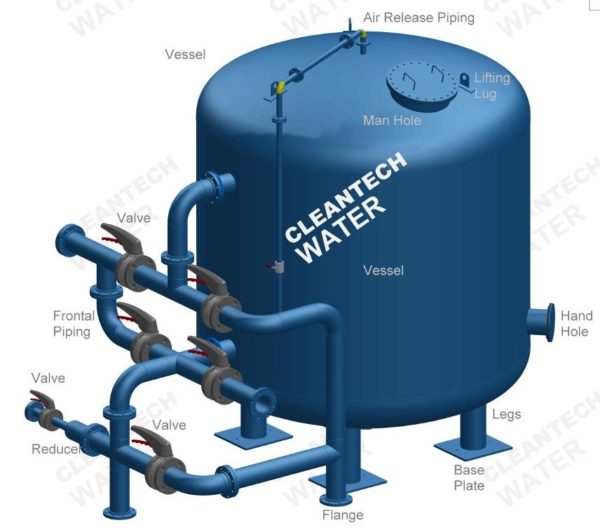Pressure sand filters play a vital role in the efficient operation of wastewater treatment plants. These filters are designed to remove suspended solids and impurities from water, ensuring clean and clear water for various applications. In this guide, we will delve into the working of pressure sand filters, highlighting their significance in sewage treatment plants in India.

Know the Working of Pressure Sand Filters
Filtration Process
Pressure sand filters employ a multilayer filtration process to remove impurities from water. The filter bed consists of graded silica sand with the finest sand at the top and the coarsest at the bottom. As water passes through the filter bed, suspended solids and other impurities get trapped in the sand bed, allowing only clean water to pass through.
Inlet and Outlet Valves
The filters are equipped with inlet and outlet valves that control the flow of water. The inlet valve allows water to enter the filter bed, while the outlet valve ensures the filtered water is discharged properly. These valves play a crucial role in maintaining the optimal flow rate and pressure within the filter system.
Backwashing Process
Over time, the sand bed in pressure sand filters accumulates impurities, reducing its effectiveness. To maintain the efficiency of the filter, a backwashing process is employed. During backwashing, the flow of water is reversed, causing the sand bed to expand and dislodge trapped impurities. The dirty water is then drained out, and the filter bed is rinsed with clean water to remove any remaining debris.
Flow Distribution System
The filters incorporate a flow distribution system to ensure the even distribution of water across the filter bed. This system comprises a series of perforated pipes or distribution plates that evenly distribute the flow of water, preventing channelling or uneven filtering. It helps maximise the contact time between water and the filter bed, enhancing the filtration efficiency.
Filter Media
The choice of filter media is crucial for the performance of pressure sand filters. Silica sand is commonly used as the filter media due to its excellent filtration properties. The sand particles effectively trap suspended solids, sediment, and other impurities present in the water. The filter media should be properly selected and periodically replaced to maintain optimum filtration efficiency.
Maintenance and Cleaning
Regular maintenance and cleaning are essential to ensure the proper functioning of pressure sand filters. This includes periodic backwashing, inspection of valves and distribution system, and monitoring the filter pressure differential. Additionally, the filter media should be checked and replaced when necessary. Timely maintenance helps prolong the lifespan of the filter and ensures consistent filtration performance.
Different Types of Pressure Sand Filters
Pressure sand filters come in various types, each designed to meet specific filtration requirements. Understanding the different types can help you choose the most suitable filter for your applications. Let’s explore some common types of:
Rapid Sand Filters
Rapid sand filters are the most widely used type of pressure sand filters. They are designed for high flow rates and are efficient in removing suspended solids and turbidity from water. These filters typically consist of a layer of coarse sand and a layer of fine sand, allowing for effective filtration.
Dual Media Filters
Dual media filters, also known as multimedia filters, employ a combination of different filter media to enhance filtration efficiency. Typically, a layer of anthracite coal is added on top of the sand bed to provide better filtration and reduce pressure drop. These filters are commonly used in applications where finer filtration is required.
Read More: Dual Media Filter As an Effective Waste Water Treatment Plant
Gravity Sand Filters
Gravity sand filters operate without the need for additional pressure. They rely on gravity to facilitate the flow of water through the filter bed. These filters are often used in small-scale applications, such as individual households or small wastewater treatment plants, where low flow rates are involved.
Pressure Multi-Media Filters
Pressure multi-media filters utilise multiple layers of different filter media to achieve superior filtration. Along with sand, other media like activated carbon, garnet, or anthracite coal may be used. These filters are effective in removing a wide range of impurities, including organic matter, chlorine, and odour.
Different Applications of Pressure Sand Filters
Pressure sand filters find extensive applications in various industries and processes. Let’s explore some common applications of these filters:
Raw Water Treatment
These filters are used in raw water treatment plants to remove suspended solids, sediments, and turbidity from the incoming water. By effectively filtering the raw water, these filters protect downstream processes and ensure the production of clean and safe water.
WasteWater Treatment
In sewage treatment plants, pressure sand filters play a crucial role in the tertiary treatment stage. They remove any remaining suspended solids and impurities before discharging the treated wastewater into water bodies or for reuse. The filters contribute to meeting regulatory standards and minimising environmental impact.
Reverse Osmosis
Pressure sand filters are commonly used as a pre-treatment step in reverse osmosis (RO) systems. RO membranes are sensitive to suspended solids and can be damaged if not adequately pre-treated. These filters remove the larger particles and sediment, protecting the RO membranes and enhancing the efficiency of the overall system.
Ultra-Filtration
In ultrafiltration systems, pressure sand filters serve as a pre-treatment step to remove larger particles and improve the performance and lifespan of ultrafiltration membranes. These filters enhance the clarity of the water, ensuring efficient operation of the ultrafiltration process.
Cooling Water Treatment
Industrial processes often require cooling water for equipment and machinery. The filters are used to treat cooling water, removing suspended solids and preventing fouling or scaling of heat exchangers and cooling towers. This helps maintain efficient heat transfer and prolong the lifespan of cooling system components.
Boiler Feed Treatment
Pressure sand filters are crucial in boiler feed treatment, where they remove suspended solids and impurities from the water before it enters the boiler. Clean water reduces the risk of scaling, corrosion, and equipment damage, ensuring safe and efficient boiler operation.
FAQs on Pressure Sand Filters
What is the purpose of a pressure sand filter in a wastewater treatment plant?
A pressure sand filter is a vital component in a wastewater treatment plant as it helps remove suspended solids, sediments, and impurities from the water. This ensures that the treated water meets regulatory standards and can be safely discharged or reused.
How often should pressure sand filters be back-washed?
The frequency of backwashing the filters depends on several factors, including the flow rate, the level of impurities in the influent water, and the filter bed’s capacity. As a general guideline, they are typically backwashed when the pressure differential across the filter reaches a specified limit or when the flow rate decreases significantly.
Can pressure sand filters remove dissolved contaminants from the water?
No, pressure sand filters are primarily designed to remove suspended solids and larger particles from water. They are not effective in removing dissolved contaminants such as dissolved metals, salts, or organic compounds. For the removal of dissolved impurities, additional treatment processes like activated carbon adsorption, ion exchange, or membrane filtration may be required.
How long does the filter media in a pressure sand filter last?
The lifespan of the filter media in these filters depends on various factors, such as the quality of the influent water, the frequency of backwashing, and maintenance practices. Generally, filter media, such as silica sand, may last several years before requiring replacement. However, regular monitoring and periodic testing of the filter media are essential to ensure optimal performance and timely replacement if necessary.
Can pressure sand filters be used for drinking water treatment?
Pressure sand filters can be used as a part of the treatment process for drinking water, especially in large-scale water treatment plants. However, it’s important to note that these filters alone may not be sufficient to meet all the drinking water quality standards. Additional treatment steps, such as disinfection and advanced filtration techniques, are often employed to ensure the water is safe for consumption.
Invest in Advanced Pressure Sand Filters
Upgrade your wastewater treatment plant today with state-of-the-art pressure sand filters and experience unparalleled filtration efficiency. Our team of experts at Cleantech Water is ready to provide you with innovative solutions tailored to your specific needs.
Investing in advanced pressure sand filters will not only enhance the performance of your water treatment plant but also contribute to a cleaner and healthier environment. Say goodbye to suspended solids, sediments, and impurities in your wastewater and hello to crystal-clear, high-quality water.
Don’t let outdated filtration systems hold you back. Take advantage of cutting-edge technology and optimise your wastewater treatment processes. Our team will guide you through the selection, installation, and maintenance of pressure sand filters, ensuring seamless integration and long-term reliability.
Contact us at +91-9099915539 or at +91-9558996411 to schedule a consultation and learn how our pressure sand filters can revolutionise your waste treatment plant. Your clean and efficient waste treatment plant is just a call away!
You can also email us at info@cleantechwater.co.in for any queries you may have. We will be happy to walk you through our products and services.

